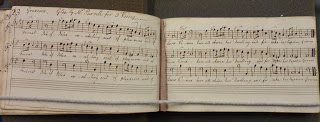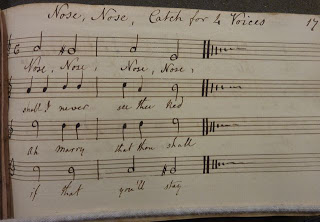 In the 18th century, paper was scarce. Journals and diaries were commonly used, and re-used, for multiple purposes and by multiple people. One of my favorite examples of this practice is the Hooke journal, which belonged to a British Army officer named George Philip Hooke, who served with the 1st Battalion Grenadiers. From 1779-1780, Hooke recorded his battalion’s movements from New York to Georgia, describing their landing at St. Simons Island, Georgia, and Siege of Charleston. While the military records were the journal’s primary purpose, what caught my eye were the 30 “catch tunes” copied in the back of the book.
In the 18th century, paper was scarce. Journals and diaries were commonly used, and re-used, for multiple purposes and by multiple people. One of my favorite examples of this practice is the Hooke journal, which belonged to a British Army officer named George Philip Hooke, who served with the 1st Battalion Grenadiers. From 1779-1780, Hooke recorded his battalion’s movements from New York to Georgia, describing their landing at St. Simons Island, Georgia, and Siege of Charleston. While the military records were the journal’s primary purpose, what caught my eye were the 30 “catch tunes” copied in the back of the book.
A catch tune, according to the Oxford Companion to Music, is a humorous 3 or 4 voice round that was popular in England in the 17th and 18th centuries. Typically for male voices, they were “designed to work well even if sung badly,” and were not intended for a formal audience. They were commonly sung in pubs and singing societies such as the Noblemen’s and Gentlemen’s Catch Club in London, established in 1761.
The Hooke journal has catches composed by the physician and amateur musician, Henry Harington, and by the great English baroque master, Henry Purcell. Unlike many catches of the day, which were often obscene with lyrics full of drinking and carousing, the Hooke examples celebrate love, marriage, and laughing.
Two examples are pictured. The example above, marked Grazzioso (gracefully), is by Henry Purcell with the words by John Dryden from the opera King Arthur.
Fairest Isle, all isles excelling,
Seat of pleasures, and of loves;
Venus here will choose her dwelling,
And forsake her Cyprian groves. To the left is a comical 8 bar round called “Nose,” where the protagonist seems to promise his love that he will stop drinking:
To the left is a comical 8 bar round called “Nose,” where the protagonist seems to promise his love that he will stop drinking:
Nose Nose, Nose, Nose,
Shall I never see thee Red
Oh Marry, that thou shall
if that you’ll stay
(unattributed)
The Hooke journal was cataloged as part of a grant funded by the National Endowment for the Humanities to create access for many of the Clements Library’s most important manuscript collections. We would like to thank the NEH for its generous support.
